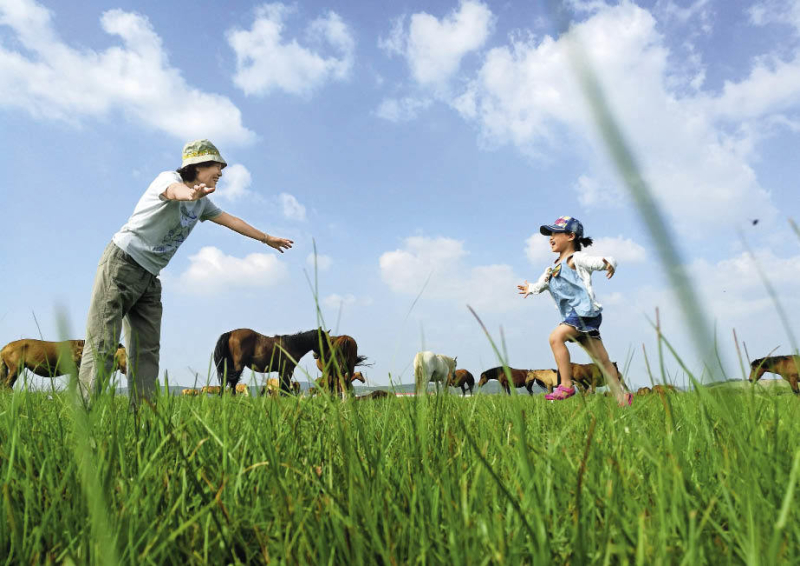Against such a backdrop, Friends of Nature, a Chinese non-governmental organization advocating environmental protection, launched a survey targeting parents, college students, and the working population on April 22, the annual globally celebrated Earth Day. The survey focused on changes of personal behavior brought about by COVID-19 and its impact on attitude toward a low-carbon lifestyle.

Saihanba Mechanical Forest Farm, once a barren wasteland about 300 kilometers north of Beijing, now boasts the world’s largest man-made forest. It has become a green haven for city-dwellers to escape from hectic urban lives and unwind.
The one-month survey gathered opinions of more than 11, 000 people. It showed that the pandemic had changed people’s focus in life, and that physical health has become the most vital part of a happy life. More than half of the respondents said they were willing to support environmental protection and climate safety by developing low-carbon consumption habits. The survey also found there are difficulties in translating ideas of environmental preservation to effective actions.
Changing Lifestyle
The rippling impact of the COVID-19 pandemic has gone beyond the sphere of public health.
But what changes has the pandemic brought to individual life? And will people continue the newly formed low-carbon lifestyle as countries across the globe roll out economic stimulus packages?
To answer these questions, Friends of Nature, with the support of the Energy Foundation, conducted the recent survey.
The survey polled parents of children aged under 15, college students, and company employees as they represent the main consumers in the following 20 years. Its findings confirmed that people’s lifestyles have changed during the pandemic.
More than 70 percent of the respondents said they began to cook at home as a result of the pandemic. This change led to a healthier lifestyle along with less food wastage and plastic pollution. Close to 40 percent of those polled said they brought their own containers when buying takeaway food.
An increasing number of company employees and college students now choose to walk or cycle, according to the survey. More than 90 percent of the respondents said they shop less frequently amid the pandemic, and 63.1 percent said the reduction of frequency in spending made them realize that some products were non-essential and that it felt good to reduce wastage of daily supplies.
The focus of people’s attention also changed. In the survey, 76.6 percent of respondents said they now place more attention on health and medical care, and 53.9 percent said they had become more concerned about the environment and wildlife, all of which may mean more support will be given to environmental protection. More than 90 percent of the polled believed environment and climate are closely associated with a happy life.
During the pandemic, various new trends have been emerging. More people chose to work from home, have turned to contactless services, and reduced their frequency of going out. Although many are still adapting to the changes, the survey results prove the feasibility of a low-carbon society. Behind the data is a sketch of an ideal life people strive for in a post-pandemic era, combining the pursuit of an indivudal for a happy life and the health and sustainability of the entire planet.
Taking Action
The COVID-19 pandemic made more than 98 percent of survey respondents realize the “invisible” challenges in their lives. The top three are extreme weather caused by climate change, public health threats including infectious diseases, and environment pollution. More than 70 percent of those polled expressed concerns over the consequences of natural resource shortages and the economic fallout of the pandemic.
At the same time, more than 60 percent agreed that natural resources on the planet are limited, and the idea that people should not damage the environment for their own benefit won the support of 79.5 percent of respondents. The findings showed that more people regard the ecosystem, rather than humanity, as the center of life. It is this awareness that lay the foundation for sustaining environmental well-being and climate safety.
The survey also revealed that the public lack knowledge of environmental issues. For example, close to 50 percent of company employees surveyed did not know the relation between the environment and the increase in energy and food consumption. The public are also divided on the influence of climate change on the environment. The survey indicated the urgency of popularizing basic knowledge of carbon emission reduction.
The major contributing factor preventing respondents from consuming in a low-carbon manner is that they find it difficult to tell which are low-carbon products and what low-carbon consumption means, and many say that low-carbon products are too expensive.
The pandemic has proven the feasability of a slow-paced life. The positive feedback given by the vast majority of the respondents shows that people are capable of practicing a lifestyle that can find a balance between humankind and the planet. Choosing a low-carbon lifestyle can make a difference, and such a change calls for the joint efforts of society as a whole.
___________
ZHANG LI is a reporter with China Environment News.